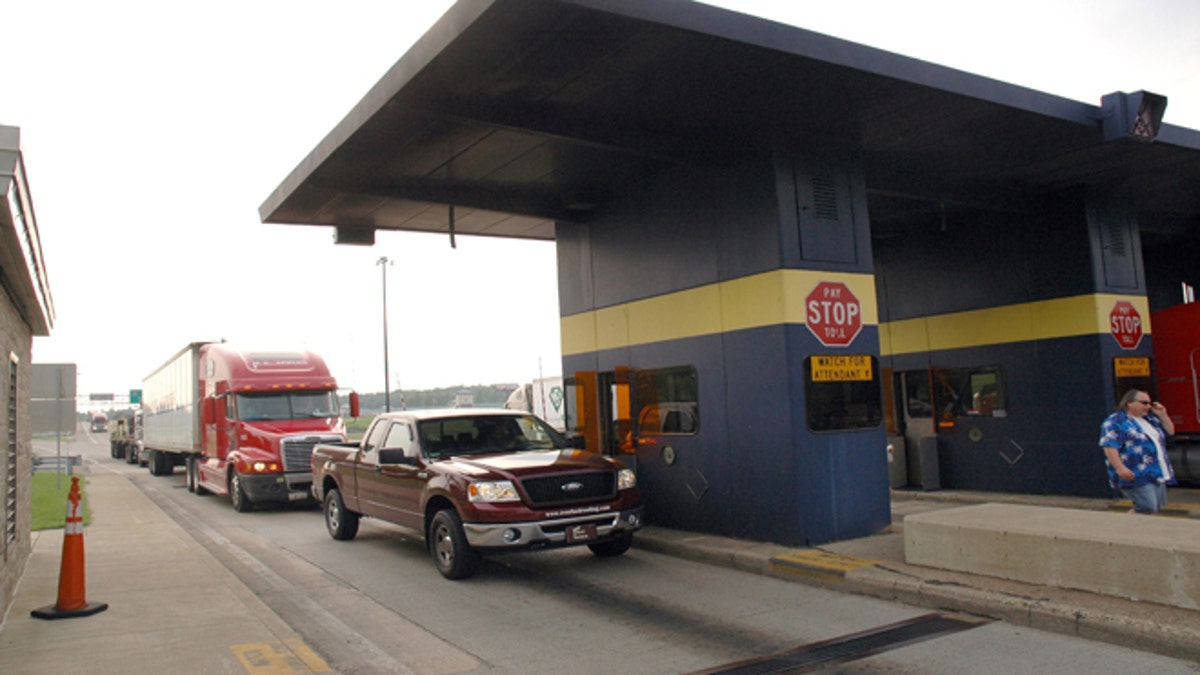
The state agency that oversees the Indiana Toll Road has given the tollway's private operator until late November 2014 to show that it's meeting its obligations to lenders amid reports the company may sell its toll road lease. ((AP Photo/Joe Raymond, File))
For once, it may be taxpayers who get away with highway robbery.
Less than a decade after a foreign consortium paid Indiana $3.8 billion for the 75-year rights to collect tolls along the Hoosier State's 157-mile Indiana Toll Road, the private firm is bankrupt and looking to unload the contract. But the deal, signed under the administration of former Gov. Mitch Daniels, who once headed the federal Office of Management and Budget, is being praised for protecting Indiana from exposure, unlike other privatization pacts that stung taxpayers.
“The state is protected,” Leonard Gilroy, director of government reform at the nonprofit research institution Reason Foundation, told FoxNews.com. “And they get to keep all the money they earned in the deal. They have invested already somewhere towards 90 different highway projects throughout the state.”
[pullquote]
Known as the Major Moves Plan, the deal with a group comprised of Spain-based infrastructure firm Cintra and Macquarie Bank in Australia, was announced with fanfare in 2006 by Daniels. Operating as the ITR Concession Company, the private firm would collect maintain the road and collect tolls until 2081 for the billion-dollar upfront payment. The state would invest the funds in an interest-bearing account and use the proceeds to fund road nearly 100 projects elsewhere in the state. It was the classic deal that so often prompts politicians to pronounce it a "win-win."
Except it now it is clear ITRCC lost.
“The investors were looking to make a splash,” Gilroy, who has followed the deal closely, told FoxNews.com. “This was an aggressive deal. They bid high to make an impact. To kick start interest in the U.S.
“You probably won’t see a lot of similar blockbuster transactions in the future,” he added.
Toll revenues, which were supposed to be used to pay back lenders who gave ITRCC money to sign the deal, didn't meet projections. Last year alone, the ITRCC took in $196 million in tolls and owed $193 million in debt service, leaving a scant $3 million to cover salaries for nearly 250 employees, maintenance, upgrades and other expenses.
Late last month, the company submitted its filing in federal bankruptcy court, acknowledging that it missed a June $102 million interest payment.
Current Indiana Gov. Mike Pence, who, like Daniels, is a Republican, said drivers and taxpayers don't need to worry about the toll operator's problems.
“Hoosiers can expect business as usual on the Indiana Toll Road,” Pence said.
For now, three possible outcomes await: Either someone else will step in and buy - for perhaps pennies on the dollar - the rights to collect tolls for the next seven decades, the ITRCC will renegotiate its deals with lenders or the toll road's operation will revert to the state.
“The deal was designed to protect the state of Indiana,” Michael LaFaive, director of fiscal policy for Michigan-based Mackinac Center for Public Policy said to FoxNews.com. “If they go belly up, the state could get it back if it’s not sold to another group. The worst case scenario would be that creditors would get control.”
According to the National Bridge Inventory, a database compiled by the Federal Highway Administration lists about 2,200 privately-owned highways across 41 states and the commonwealth of Puerto Rico.
Cintra also runs operations for a swath of State Highway 130 in Texas as well as the Chicago Skyway, but those deals are not affected by the Indiana bankruptcy. But Maquarie Bank has been burned before in bids to run private toll roads in the U.S., according to a 2007 report. Two of the bank's major projects, including the South Bay Expressway in San Diego, went bankrupt and another two were bought back at discounts by local government jurisdictions.








































